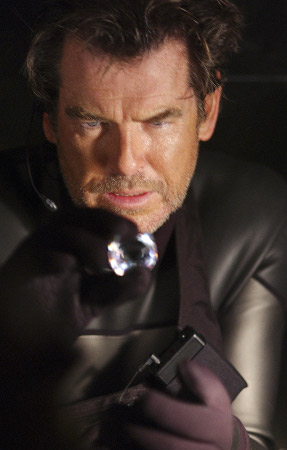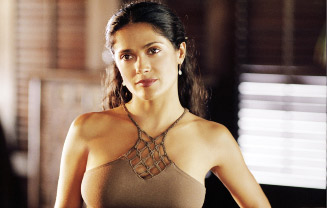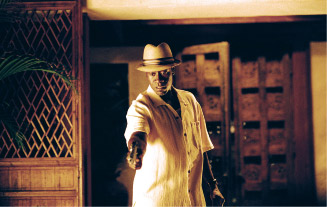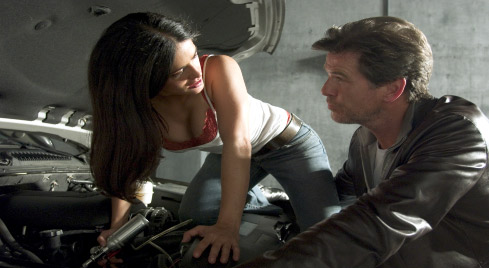
Rising Sun: An interview with AFTER THE SUNSET Scribe Paul Zybszewski
November 11th, 2004
by Christopher Wehner

Paul Zybszewski's original screenplay AFTER THE SUN was discovered by producers Beau Flynn and Tripp Vinson, whose credits include such critically acclaimed movies TIGERLAND and REQUIEM FOR A DREAM. The script was purchased by New Line Cinema in June 2002 for an undisclosed amount in the six-figure range.
The typical heist movie ends with the thieves on some tropical island after successfully completing a last 'big score.' In AFTER THE SUN, the story takes place where other films leave off, after the big score and on the tropical island.
So what happens when a couple of thieves try to retire? In this story, Max (Pierce Brosnan) and his beautiful accomplice Lola (Salma Hayek) have come to Paradise Island in the Bahamas, fresh off their final big score in which they lifted the second of the three famous Napoleon diamonds. With their financial future set, the couple is ready to relax and enjoy their hard-earned riches.
But Max's nemesis, scorned FBI agent Stan (Woody Harrelson), who has spent years in persistent but failed pursuit of Max, refuses to believe that the master thief is actually calling it quits. He believes Max and Lola are actually plotting to steal the third Napoleon diamond, which is coincidentally scheduled to arrive on Paradise Island as part of a touring cruise ship exhibition.
"There's a quote from Stephan King, I believe," says screenwriter Paul Zbyszewski, "Never trust a writer who has written more than he was read."
Born and raised in Chicago, he started his career in humble surroundings as a television producer working early morning news shows. "I was getting tired of waking up at three in the morning every day."
So he and his wife took a chance and moved to Los Angeles, each seeking a fresh start in their respective careers. Zbyszewski got a job as a writer's assistant and soon was working in television, but this time it felt like he was getting somewhere. "I was learning an incredible amount about writing and production and I couldn't imagine taking a different route than I did."
I got the chance to speak with Zbyszewski not too long after he got his first chance to screen his movie. When I asked how it went he paused, as if still not believing he'd really done it, "[it] was beyond my wildest expectations, it really was. You can't beat the cast or the director. I was very fortunate to have that talent involved with my first feature film."
"When you come out of nowhere and sell a script, and it's made," says the writer. "And it's made with that cast and budget, people take notice. I get my phone calls returned and I'm doing meetings and pitches. It's changed everything for me."
 SM: You were born and raised in Chicago, started out as a television producer (won an Emmy in 1995), what lead you into screenwriting? PZ: I was a television producer for the local FOX affiliate station, WFLD, doing some NFL, Mike Ditka show, and post game shows. Then I moved to morning news and did that for several years. If you wanted to do television in Chicago your options were limited to stuff like sports news, Oprah, Jerry Springer, and I was not digging that. I always felt like I was a writer and wanted to entertain. My wife and I decided that getting up at 3 a.m. and doing the morning news was kind of killing us and really wasn't what we wanted to do. My wife is from San Diego so there's a little of a California connection. We essentially loaded up the truck and headed west to start over. We came out with no jobs and no place to stay. I started out as a PA runner for a trailer company.
SM: You were born and raised in Chicago, started out as a television producer (won an Emmy in 1995), what lead you into screenwriting? PZ: I was a television producer for the local FOX affiliate station, WFLD, doing some NFL, Mike Ditka show, and post game shows. Then I moved to morning news and did that for several years. If you wanted to do television in Chicago your options were limited to stuff like sports news, Oprah, Jerry Springer, and I was not digging that. I always felt like I was a writer and wanted to entertain. My wife and I decided that getting up at 3 a.m. and doing the morning news was kind of killing us and really wasn't what we wanted to do. My wife is from San Diego so there's a little of a California connection. We essentially loaded up the truck and headed west to start over. We came out with no jobs and no place to stay. I started out as a PA runner for a trailer company.
I started working my way up the ladder, bounced around a little, and finely got a job as a writer's assistant on a couple of Showtime shows. Peter Lefcourt and Beggars and Choosers was really were I started to learn about writing. How the writer's room works, how writers breakdown stories, and how television shows work. Working with Peter was a great experience, and he couldn't have been nicer to me, but most importantly he was an excellent writer and taught me a lot about the profession.
What were your responsibilities? Everything. Taking notes from the writer's room, handling all Peter's calls, keeping track of storylines, the bible. Peter pointed out to me that a lot of writers who are staff writers don't really get to see how a television show is run. The only two people are the show runner and his assistant.
As a writer's assistant your goal is to move up and be a staff writer then? I was there for two seasons under Peter, you hope obviously that you'll get a freelance episode and then work your way up the ladder as a staff writer. It didn't work out that way, unfortunately, the show was canceled after the second season. But the experience I got by being around the writers, reading the scripts, it didn't matter that its television, the art of storytelling is all the same. I got to pick their brains. It was like taking four or five courses at once. All the experience I was getting was just incredible.
Any film school? I had taken some college courses but this was by far the most important aspect of my development as a writer. I had read all the books, but I never thought of writing as something that required that much instruction, at least from manuals. It's about building a structure and a framework in an entertaining way. The structure of a television show and how an episode is mapped out is a great way to learn how to build a story. Television and film are different, but not the way you tell the story.
Along with writing spec television shows I also wrote features. Peter was nice enough to read some of my writing and go through it sometimes page by page and point out what works and what doesn't.
Was it during this time you started to write After the Sunset? Yes and no. The story kind of rolled around in my head for a while in terms of the characters. I had these characters of Max and Stan. After seeing a string of heist movies that were all pretty much the same, that's when this idea really started to germinate.The thing is I'm very affected by the fiction I read. I love mystery and modern fiction, Elmore Leonard, Robert Crais, Michael Connelly, and others. They write some of the coolest characters in fiction. That was the kind of tone that I wanted. The thing about heist movies, is in the end they pull off the impossible heist, they get the jewel, they ride off into the sunset and go to the tropical island. What then?
So you wanted to pick up the story there, after the two expert thieves have already pulled off their big score and retire. "What happens when a jewelry thief retires?" Exactly. Maybe paradise for them isn't all that it was supposed to be. You know what's happiness for them? If they love what they do, how hard is it to give it up? So the hook is there, "The heist movie that starts where the others leave off." Once I had that, the story really revealed itself to me: character, situations, action, story, and tone. The story came pouring out. What if their nemesis continues to come after them? Things like that.
It's an interesting take on the genre. The hook is there. You mentioned the clichés of past heist flicks, which really do hamstring the genre and make it predictable to the point where they have to rely on bigger and bigger action and heist sequences. How did you avoid that pitfall? Well you almost have to acknowledge those things, but put a new twist on them. I wanted to approach it with a different kind of tone. They've already done the noir/gritty heist films: Thief, Heat, Asphalt Jungle, and then you have your debonair kind of heist movies like The Thomas Crown Affair. I wanted to write something fun and entertaining first and foremost. I think that's expected in the genre. I'm a popcorn movie fan and I want movies to entertain me. Life outside the theater is scary enough sometimes.
 I was looking to play with the genre in a comedic sort of way and make it not so much about planning this elaborate heist or the object of the heist, but about these characters. How they interact and why they do what they do. Playing with the subtly and psychologies of these characters. This is more about the characters and having fun with them.
I was looking to play with the genre in a comedic sort of way and make it not so much about planning this elaborate heist or the object of the heist, but about these characters. How they interact and why they do what they do. Playing with the subtly and psychologies of these characters. This is more about the characters and having fun with them.
Were you thinking then in terms of emotional arcs for Max and Lola? How did you begin to build the narrative? I think it all begins with character in this story. Mainly the expectations Max had about retirement compared to the reality. The character's mindset and the journey I am taking the character and audience on. When I hear the character's talking to each other in my head, than facing that blank page isn't intimidating. So it's a process until I reach that point. That's always exciting when it happens. You see themes and exchanges and kind of the basic plot thread of what you're trying to accomplish and then the characters kind of fill in the rest, it's a fun way to discover the story.
Did you have an agent at the time you finished the script? How did you get it out there to producers? I had a manager by the name of Chris Pollack, hardest working man in show business and one who really works well with the unknown writer. He had taken one of my scripts, a horror thriller and sent it out to a bunch a producers. Though it didn't sell, it did get me meetings and it did open some doors. Some of the producers said they wanted to see what else I had, which turned out to be After the Sunset.
It went out on a Tuesday to a handful of producers and by Friday it sold. It was one of those whirlwind deals that I had only read about. It was crazy. I was in Indianapolis at a wedding and I'm getting calls about deal points, it was surreal. My wife took a picture of me standing outside a little shop as I received a call from Chris telling me what was happening and who was involved. I have that photo on my desk.
The Firm (the production company) was great. As a matter of fact, one of those producers who said she would read anything I had was Eliza Ferguson who is no longer with them. She was instrumental in getting New Line onboard. She really championed the script. If you think about it, the odds of my script getting made weren't great. It was a spec script by an unknown writer, not adapted from a comic book, video game, best selling novel, or magazine article. Somehow it gets sold, stars attached, name director, and it's made.
You sell the script, you do some rewrites, but ultimately they bring in some other writers. How difficult was that? I did a rewrite. It's hard for a writer to be told that they want to bring in someone else. But honestly, with that being said, as an original writer you're too close to the material sometimes. You have to remember that it's no longer yours. They put up the money and they are entitled to do what they want. It's a collaborative effort and you have to keep that in mind. Everyone is rewritten, from William Goldman on down. Yea, it stung a little, but you get over it. I was like the Cubs and the playoffs, I was just happy to be there.
Comparing the final cut of the film with your original script, is there any one thing you wish they had left in or had not changed? Good question. You know, I couldn't pinpoint one thing. Obviously when you write the script and its your baby and you told the story the way you wanted it and you then see it on screen. You realize your baby grew up. You start to think what if they did this or that? But you realize those pieces don't really fit the final puzzle. They have reasons for what they changed or whatever.
 When you first developed the story was there a love interest right away for Max (Lola was she in the story then)? Yes. Lola was Lola, and she was usually one of the favorite characters of everyone who read the script. I always viewed her as Max's anchor. She was his base. They had a history together and she was the kind of person who had grown to the point where she was ready to let their previous life go. Whereas Max really wasn't sure he could. She was focused on living their life for them Max needs Lola to bring him around to that place.
When you first developed the story was there a love interest right away for Max (Lola was she in the story then)? Yes. Lola was Lola, and she was usually one of the favorite characters of everyone who read the script. I always viewed her as Max's anchor. She was his base. They had a history together and she was the kind of person who had grown to the point where she was ready to let their previous life go. Whereas Max really wasn't sure he could. She was focused on living their life for them Max needs Lola to bring him around to that place.
Was Stan always an FBI agent in your drafts or was he ever a thief as well? I'm a fan of the buddy genre, the dynamic between characters and the dichotomy that arises, but Stan was always an FBI agent, he was always Max's nemesis. They respected each other but also hated one another. So I had these two characters to begin with and once I found the right setting, it kind of just flowed from there. You know, every movie ends with heroes riding off into the sunset and for me it was what happens then. So their relationship and the dynamics of that really helped inform my decisions as I wrote.
Did Stan always have a love interest? Yes. Sophia was there from the beginning. The relationships from my original drafts remain pretty much the same, which I'm really happy with. Her function as a character was to help awaken something in Stan which he hadn't expected.
I got the feeling while reading the script that the heist sequences, which were fairly unique, weren't written by the same writer who wrote everything else. The opening scene felt like it was added on. Very perceptive, so no, they were not written by me, and as I said, this story is about the characters. When I first wrote it I kind of wanted to write the anti-heist movie. My very first original draft actually starts with Max on the beach, there is no opening heist. He's this character that you kind of discover throughout the script as a master thief. You don't see any of it until the end when he pulls this heist and the heist I had originally put in there was very basic and simple. It wasn't an element that I wanted to stress. But, of course, it gets sold and the studio has to do what they feel will help make the story better.
Too many writers today start off their story by trying to come up with cool ideas and not good characters to build around. Yea, it's the trouble with the heist genre and everything that'sbeen done with it, it'seasy to write yourself into a corner because you're trying to be bigger, faster, better, and so on. That wasn't my intention and I was able to avoid that. Truthfully, I dreaded coming up with the heist sequence when I originally wrote the script. I thought. "Ugh, I gotta figure out a heist." It's tough and it wasn't my strength.
And thankfully someone saw the quality of this script and realized, "Hey we can just hire someone to add a couple of heist scenes, no problem." Absolutely, and truthfully those scenes do not detract from the picture, and they do add production value. It's so hard for producers, writers, directors, and executives to take chances anymore. Because of the nature of pre-sold material, corporate Hollywood, the need for movies to not just make money, but make lots of money. The fact is, you have to pity some of these creative executives and producers who take home bundles of scripts every weekend, and they are getting to page ten and nothing appears to be happening, and you know it has to take some patience to continue reading beyond that most probably don't.
What are you top 5 caper/heist films? Ah, you're putting me on the spot. [laughs] Well, if you go back to the basics, Asphalt Jungle, which was a character film. There's only one heist and it comes at about the mid-point, and the rest is all about these guys John Huston was nominated for best director and writer [novel by W.R. Burnett]. To Catch a Thief, Michael Mann's Thief, and I thought The Thomas Crown Affair was good, even the remake.
With Pierce Brosnan also being in The Thomas Crown Affair, was there some trepidation over his selection or did you write it with him in mind? I never think of actors when I'm writing. I want the characters to be on their own. I'm thrilled he took the role. If DeNiro can play mobster after mobster and cop after cop, and Al Pacino can, and no one seems to care, Pierce can play thieves. And you know what, Pierce plays a hell of a thief. The guy's got charisma, sense of humor, and woman love him.
Did you get to be on set? Yea, the producers were great they invited me to the set. I was not able to go as we were expecting our first child. I did get to go when they were in LA and meet the cast, which was a thrill. Something I'llnever forget.
More recent articles in Interviews
Only logged-in members can comment. You can log in or join today for free!
Advertisement






